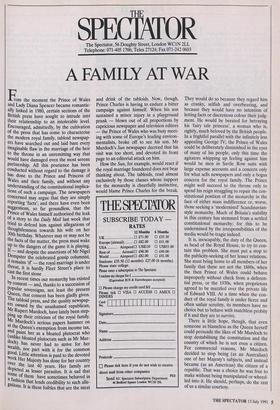The Spectator, 56 Doughty Street, London WC1N 2LL Telephone: 071-405
1706; Telex 27124; Fax 071-242 0603
A FAMILY AT WAR
From the moment the Prince of Wales and Lady Diana Spencer became romantic- ally linked in 1980, certain sections of the British press have sought to intrude into their relationship to an intolerable level. Encouraged, admittedly, by the cultivation of the press that has come to characterise the modern royal family, tabloid newspap- ers have searched out and laid bare every imaginable flaw in the marriage of the heir to the throne in an unremitting way that would have damaged even the most serene partnership. All this prurience has been conducted without regard to the damage it has done to the Prince and Princess of Wales and their family, and without any understanding of the constitutional implica- tions of such a campaign. The newspapers concerned may argue that they are simply reporting 'facts': and there have even been suggestions, so far groundless, that the Prince of Wales himself authorised the leak of a story to the Daily Mail last week that tried to defend him against allegations of thoughtlessness towards his wife on her 30th birthday. Whatever may or may not be the facts of the matter, the press must wake up to the dangers of the game it is playing. If — and despite the assertions of Mr Nigel Dempster the celebrated gossip columnist, it remains `if — the royal marriage is under threat, it is hardly Fleet Street's place to cast the first stone In recent times our monarchy has existed by consent — and, thanks to a succession of Popular sovereigns, not least the present Queen, that consent has been gladly given. The tabloid press, and the quality newspap- ers owned by the unashamed republican, Mr Rupert Murdoch, have lately been step- Ping up their criticism of the royal family. Mr Murdoch's serious papers hammer on at the Queen's exemption from income tax, and paint her as a bloated plutocrat who (unlike bloated plutocrats such as Mr Mur- doch) has never had to strive for her wealth, nor part with it for the common good. Little attention is paid to the devoted work Her Majesty has done for her country over the last 40 years. Her family are depicted as lesser parasites. It is sad that some of them have sometimes behaved in a fashion that lends credibility to such alle- gations. It is these foibles that are the meat and drink of the tabloids. Now, though, Prince Charles is having to endure a bitter campaign against himself. When his son sustained a minor injury in a playground prank — blown out of all proportions by capricious newspaper and television editors — the Prince of Wales who was busy meet- ing with some of Europe's leading environ- mentalists, broke off to see his son. Mr Murdoch's Sun newspaper decreed that his visit was too short, and devoted its front page to an editorial attack on him. How the Sun, for example, would react if the royal marriage foundered does not bear thinking about. The tabloids, read almost exclusively by those classes whose support for the monarchy is cheerfully instinctive would blame Prince Charles for the break
They would do so because they regard him as cranky, selfish and overbearing, and because they would have no intention of letting facts or discretions colour their judg- ment. He would be berated for betraying his 'fairy tale princess', a woman who is, rightly, much beloved by the British people. In a frightful parallel with the infinitely less appealing George IV, the Prince of Wales could be deliberately diminished in the eyes of many of his people, only this time the agitators whipping up feeling against him would be men in Savile Row suits with large expense accounts and a concern only for what sells newspapers and only a bogus concern for the royal family. The Prince might well succeed to the throne only to spend his reign struggling to repair the con- stitutional position of the monarchy in the face of either mass indifference or, worse, those seeking a 'modernised' Scandinavian- style monarchy. Much of Britain's stability in this century has stemmed from a settled constitutional monarchy; for this to be undermined by the irresponsibilities of the media would be tragic indeed.
It is, inescapably, the duty of the Queen, as head of the Royal House, to try to con- tain this problem. She must put a stop to the publicity-seeking of her lesser relations. She must bring home to all members of her family that these are not the 1880s, when the then Prince of Wales could behave improperly without check from a deferen- tial press, or the 1930s, when proprietors agreed to be muzzled over the private life of Edward VIII. At a time when the con- duct of the royal family is under fierce and often unfair scrutiny, its members have no choice but to behave with matchless probity if it and they are to survive.
There is little hope, though, that even someone as blameless as the Queen herself could persuade the likes of Mr Murdoch to stop destabilising the constitution and the country of which he is not even a citizen. For commercial reasons, Mr Murdoch decided to stop being (as an Australian) one of her Majesty's subjects, and instead became (as an American) the citizen of a republic. That was a choice he was free to make without being manipulated or wheed- led into it. He should, perhaps, do the rest of us a similar courtesy.


















































 Previous page
Previous page